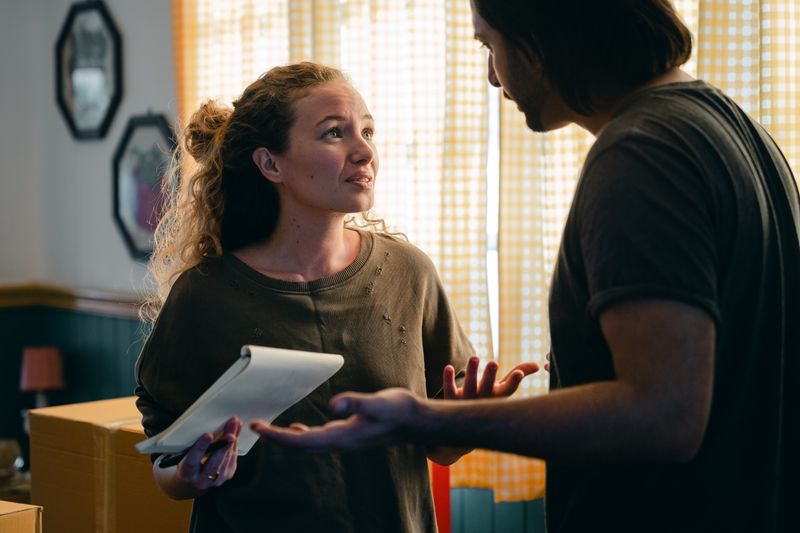Our Flag Means Death: A Philosophical Exploration of Freedom
In the ever-evolving landscape of television, there are few shows that manage to capture the attention and fascination of viewers quite like “Our Flag Means Death.” The first season took audiences on a long and strange voyage, starting off as a period comedy reminiscent of Monty Python and then transforming into a tender queer love story set within the world of pirates. Now, as the highly anticipated second season returns, the show delves even deeper into the complexities of freedom and the choices we make.
The Setting: A Pirate Ship in 1717
It is hard to imagine a richer setting for an exploration of freedom than a pirate ship in the year 1717. The Golden Age of Piracy coincided with the Age of Enlightenment, a time when thinkers like John Locke and Jean-Jacques Rousseau pondered the balance between individual liberty and societal norms. However, while these ideas were being discussed among the educated elite, society at large remained repressive, with loveless marriages, sodomy punishable by death, and chattel slavery as the norm.
A Fictional Twist on Reality
Creator David Jenkins takes these historical realities and plunges them into the realm of unmistakable fiction. Rather than portraying psychopathic characters, the show presents pirates as misfits shaped by their troubled childhoods and societal constraints. Stede Bonnet, the so-called Gentleman Pirate, speaks to the discomfort of being trapped in a married state, and it is through his love affair with the notorious Blackbeard that both characters find the liberation they seek.
What sets “Our Flag Means Death” apart is that it is not a story about two men coming out as gay; it is a story about two individuals who realize they were made for each other. Love becomes the catalyst for their liberation, and piracy becomes a means to that end. In this anarchic and casually anachronistic fantasy world, queer relationships thrive on the pirate ship Revenge, and gender roles are as fluid as gender expression. The show’s portrayal of freedom extends beyond love to encompass a range of expressions, from nonconforming gender identities to liberated women challenging societal norms.
Freedom and Moral Responsibility
As the second season of “Our Flag Means Death” unfolds, it explores the tension between freedom and moral responsibility. While the show delights in its adventurous and humorous moments, it does not shy away from the darker side of freedom. Characters must grapple with the consequences of their choices, facing stomach-churningly awful decisions alongside healthy ones.
The Risk of Darker Waters
Creator David Jenkins takes a risk as he navigates into darker waters, testing the love between Stede and Blackbeard. This move challenges shippers who simply want to see pirates in romantic moonlight scenes, pushing the show to maintain real conflict and avoid descending into inanity or fan service. The complexity of the characters, including their capacity for both good and evil, adds depth to the narrative and elevates the storytelling beyond mere entertainment.
A Balancing Act
The second season of “Our Flag Means Death” walks a delicate balance between remaining fun and daring, while also confronting difficult psychological and moral dilemmas. As the initial pathos dissipates, the story occasionally becomes mired in episodic filler, reminiscent of the show’s early episodes. Nonetheless, even in these moments, the show reminds us that freedom, by its very nature, is not always smooth sailing.
Editorial: The Significance of “Our Flag Means Death”
“Our Flag Means Death” is not just another television show; it is a thought-provoking exploration of freedom, love, and moral responsibility. In a world where individual liberties often clash with societal expectations, the show challenges us to reconsider the choices we make in pursuit of liberation.
By weaving together the historical realities of piracy with fictional elements, “Our Flag Means Death” forces viewers to confront the uncomfortable truths of the past, while also presenting an alternative vision of freedom. It boldly portrays queer relationships and challenges gender norms, highlighting the importance of acceptance and self-expression.
At its core, “Our Flag Means Death” reminds us that freedom without moral responsibility can lead to nihilism and emptiness. It presents a nuanced portrait of characters who must grapple with the consequences of their actions, ultimately asking us to reflect on our own choices and consider the broader implications of our paths to liberation.
Advice: Embracing the Complexity of Freedom
As viewers, we can derive valuable lessons from “Our Flag Means Death.” In our own lives, it is crucial to embrace the complexity of freedom and recognize that it entails not only personal liberation but also a responsibility towards others. We must navigate the choices before us with careful consideration, understanding that our actions have ripple effects that extend beyond ourselves.
Furthermore, “Our Flag Means Death” reminds us of the importance of acceptance and inclusivity. By depicting queer relationships and fluid gender identities in a historical context, the show challenges societal norms and encourages us to create spaces where all individuals can express themselves freely.
Finally, the show prompts us to examine our own societal structures and question whether they truly promote freedom for all. By highlighting the repressive aspects of history and contrasting them with a world of liberated pirates, “Our Flag Means Death” compels us to reflect on the ways in which our current systems may still hold us back from true freedom.
“Our Flag Means Death” serves as a poignant reminder that freedom is a multi-faceted concept, encompassing personal liberty, social responsibility, and inclusivity. It is a call to action, encouraging us to navigate the turbulent waters of life with a deep understanding of the complexities and consequences of our choices.

<< photo by NEOM >>
The image is for illustrative purposes only and does not depict the actual situation.
You might want to read !
- “Katie Hobbs Perseveres as Arizona Governor Amidst Rumors: An Unyielding Leadership”
- “Rick and Morty” Season 7 Trailer Analysis: Exploring Justin Roiland’s Hilarious Animation Universe
- “Exploring the Exciting New Voice Actors in the ‘Rick and Morty’ Season 7 Trailer”
- “Regency Revelry Continues: Sneak Peek at ‘Bridgerton’ Season 3 Teases Penelope and Colin’s Storyline”
- The Evolution of “Mean Girls” on TikTok: How the Movie Celebrates its Cultural Impact
- Exploring the Intersection of Pop Culture and Streaming Services: A Guide to Watching ‘Mean Girls’ for Free
- “Mean Girls Day: Tina Fey’s Auctioned Annotated Script Reveals Behind-the-Scenes Insights”
- Nintendo and Lego Team Up for an Adorable Animal Crossing Collaboration
- Unlocking the Block: Nintendo and Lego Team Up for Animal Crossing Expansion
- From Milan to Porto: A Year Apart and Worlds Apart for the…




